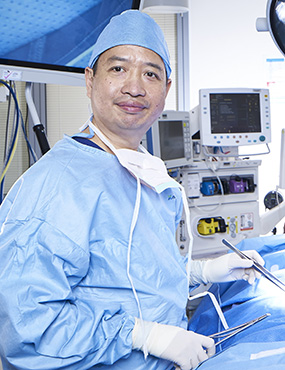Innovations in minimally-invasive heart surgery
Professor Martin Ng performs the southern hemisphere’s first percutaneous repair of a tricuspid heart valve at Macquarie University Hospital.

Innovative surgical procedure
Macquarie University Health’s Professor Martin Ng successfully performed a minimally invasive repair of the tricuspid valve to address tricuspid regurgitation, a condition where the damaged valve leads to the backflow of blood from the right ventricle to the right atrium.
The innovative procedure used MitraClip technology, previously only applied to the left bicuspid valve. Professor Ng successfully conducted the procedure under the guidance of visiting German cardiologist Professor Stephan von Bardeleben, Head of the Centre of Structural Heart Disease Interventions and the Heart Valve Centre in Mainz, Germany.
“This heart condition is going untreated worldwide and the condition can be debilitating and lead to heart failure and death,” explained Professor Ng. “Not only is there is a general lack of understanding of this disease, but for elderly and high-risk patients, the traditional open-heart method is too dangerous.
“This minimally invasive approach—rarely performed anywhere in the world—is beneficial for high-risk patients for whom open heart surgery is too risky. With the general lack of expertise, technology and understanding of this application, we are delighted to have brought it to Australia for the first time for the benefit of our patient, Mr John Lakos.
“We are especially privileged to have had Professor Bardeleben travel to Australia to oversee this first procedure. He is the pioneer in the field and there is no better person to have had alongside us as we performed our first case.”
Since 1986, when patient John Lakos was diagnosed with aortic valve disease at the age of 39, he has undergone several valve procedures. The first was a Bentall’s procedure through open heart surgery to replace the faulty aortic valve with a mechanical one.
Twenty years later, in 2006, John developed another aneurysm in the aortic arch that was treated by surgeon Professor Michael Wilson in a Bentall’s repair. Three months later, John’s descending aorta also developed an aneurysm, which was treated with stents inserted via the groin.
In March 2018, John developed a ‘false aneurysm’ at the site of his original valve defect and Professor Wilson again performed open heart surgery at Macquarie University Hospital in a repair of the Bentall’s repair that saw John receive a biological (pig) valve.
Earlier this year, his cardiologists noticed a leaky mitral and severely leaky tricuspid valve.
“I felt breathless and found it hard to even climb a flight of stairs,” recalled John. “Michael Wilson was reluctant to operate with open heart because I had had so many open-heart procedures already.
“The conventional solution was for Professor Ng to perform percutaneous MitraClipping of the mitral valve with the objective of releasing pressure on the tricuspid valve. If that didn’t work, then we had no choice but open-heart surgery to implant an artificial tricuspid valve. The hope was that the repair of the mitral valve would improve the functioning of the severely leaking tricuspid valve.
“However, when I saw Professor Ng to organise the proposed MitralClip, he presented me with an unexpected option. A world-leading German cardiologist was coming to Australia to supervise a tricuspid clip – never before performed in the Southern Hemisphere. Professor Ng also advised that I had been selected because I was a suitable candidate for the procedure. Accordingly, I became the first patient in the Southern Hemisphere to undergo this procedure.
“In July 2019, Professor Ng, under the supervision of Professor von Bardeleben, performed the percutaneous clipping of my mitral valve and tricuspid valve. It was amazing timing for me personally, but fantastic that this procedure is now available in Australia. I was delighted that the procedures were performed at Macquarie University Hospital where the care in the ward and ICU is absolutely fantastic.”
Professor Ng said that John’s condition has dramatically improved. He no longer gets short of breath conducting his daily activities and he has returned to his regular swimming routine, something he has done for years as daily exercise.
“As a centre of excellence, Macquarie University Hospital is not just performing well-established procedures,” said Professor Ng, who is one of Australia’s leading interventional cardiologists. “We pride ourselves on trying what hasn’t been done before and this latest surgery is an example.”